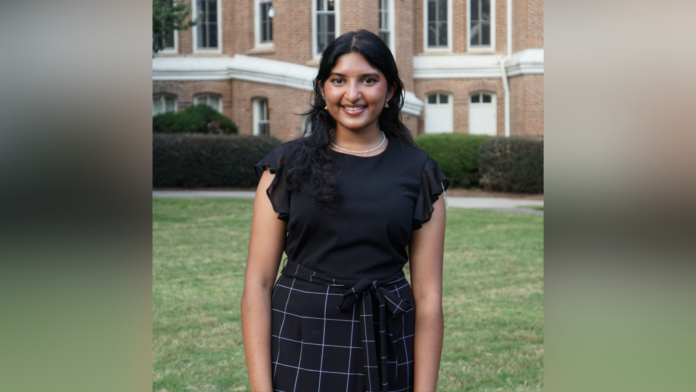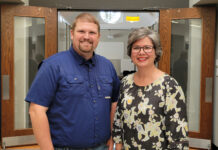A Mercer University student has stepped up to make women’s health care products more accessible to students on the Macon campus.
Junior Sreeja Pandiri, a neuroscience major on the premed track, was awarded a $1,000 minigrant this spring from Mercer’s Visionary Student Panel in support of her project, “Period Product Accessibility: Let’s Go Aunt Flow.” With the funds and in partnership with company Aunt Flow, Pandiri purchased two wall-mounted period product dispensers that were recently installed in two buildings.
A few coin-operated dispensers already exist on campus, but Pandiri wanted to add dispensers to more high-traffic areas and offer products free of charge. One machine was installed in the women’s restroom near Hawkins Arena in the University Center and one in the women’s restroom on the main level of the Connell Student Center. In addition, a box with supplies has been added to the Connell Student Center’s gender-neutral restroom. The Student Government Association’s Campus Safety and Improvements Committee, which Pandiri chairs, will cover the cost of restocking the dispensers.
“I wanted to give back to that community that’s made me the best version of myself,” said Pandiri, who plans to become an adolescent psychiatrist. “As a premed student, accessibility to health care has always been really important to me. A lot of people think about accessibility to health care as being able to see a doctor or have health insurance, but period products are also a part of that accessibility, so that’s my way of giving back.”
Pandiri’s inspiration for the project came while attending a leadership conference in Atlanta hosted by URGE, which stands for Unite for Reproductive & Gender Equity. She learned about making reproductive care more accessible on college campuses and was introduced to Aunt Flow, a company that provides period products to universities at discount prices.
Mental health is a vital component of women’s health care, and Pandiri said the dispensers will give students one less thing to worry about. Finances may be tight for some students, and a quick trip to the store for supplies may not be possible since many don’t have a car.
Pandiri hopes her project will make students feel cared for and give them a better sense of security on campus.
“I really hope this fosters a sense of community among students, that people will see this initiative and be inspired to have their own initiative to give back to the community,” she said.










